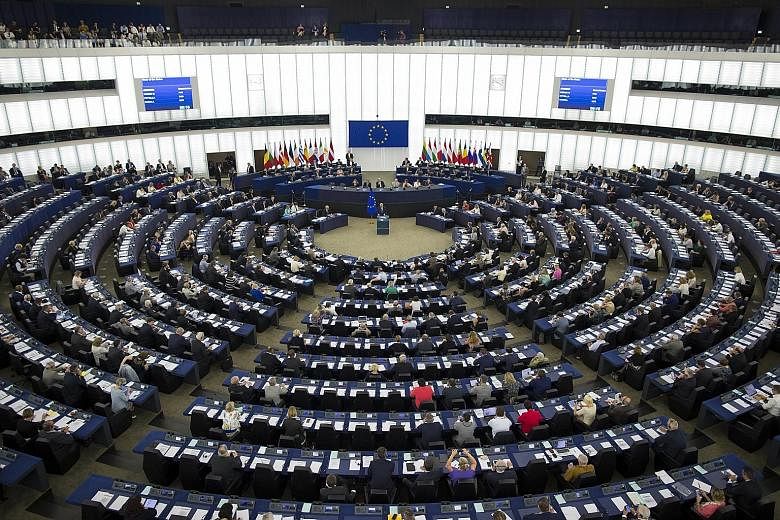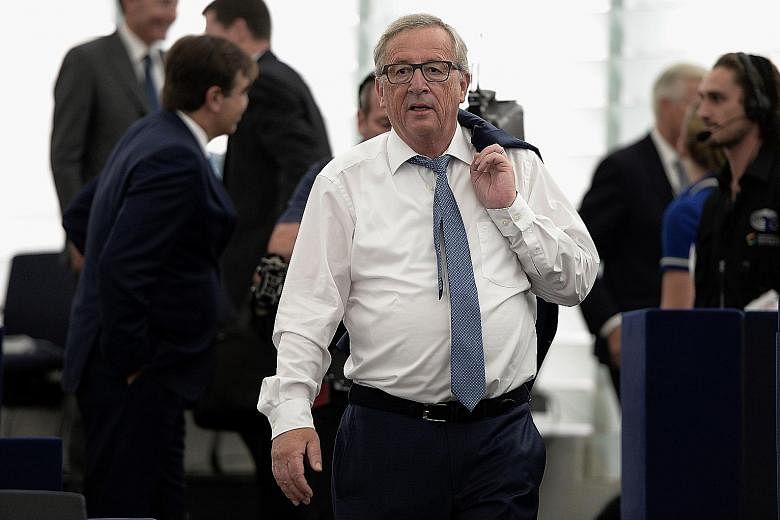STRASBOURG • European Commission president Jean-Claude Juncker has warned London again that it could not have access to Europe's single market if it bars some EU citizens from working in Britain after Brexit.
Mr Juncker's warning came as he unveiled a raft of proposals to revive crumbling trust in the European Union after the Brexit vote, ranging from job creation to tightening borders. He also told Members of the European Parliament that the EU needs a military headquarters to work towards a common military force, as the lack of a "permanent structure" resulted in money being wasted on missions.
Mr Juncker, speaking to the European Parliament yesterday in his annual State of the Union address, tried to rally support for the EU, saying the bloc, battered by Britain's Brexit referendum, was not about to break up despite its existential crisis.
Noting his own executive was limited in its response to problems by division among states that was the worst he had seen in three decades in EU politics, he said: "There are splits out there and often fragmentation exists. That is leaving scope for galloping populism."
Mr Juncker underlined that he believed the world's biggest trade bloc was still an important force but he did have a warning for Britain.
"There can be no a la carte access to the single market," he said, adding that unlimited access to the internal market is only for those "who accept that there will be free access for persons and goods".
The point has been made repeatedly by Brussels as it waits for British Prime Minister Theresa May to launch the formal process of negotiation. EU leaders will meet in Slovakia's capital Bratislava to grapple with the issue tomorrow - without Mrs May.
The British government wants to retain trade access on the best terms with the EU but, following the June referendum, says free immigration from the EU must end. Mr Juncker insisted that "too often, national interests are brought to the fore" in Europe.
The BBC noted that remark contrasted with a warning from European Council president Donald Tusk, the chairman of tomorrow's informal summit. Late on Tuesday, he said that the EU should be mindful of its own ambitions in the light of the Brexit vote.
"The keys to a healthy balance between the priorities of member states and those of the Union lie in national capitals," he said. "The institutions should support the priorities as agreed among member states, and not impose their own ones."
Mr Guy Verhofstadt, the Parliament's negotiator on Brexit, also made a similar point at yesterday's debate. He said the European Union should treat the negotiations with Britain as an occasion to make progress rather than take revenge. "Brexit is not a liability. I see it more as an opportunity," he said. "Our duty, our responsibility is to make Brexit a success for Europe, for all citizens of Europe.
"Brexit is not a matter of punishment, it's not a matter of revenge," he said, addressing British eurosceptic members who have described him as an anti-British "fanatic" in his pursuit of a more closely integrated EU.
On Tuesday, Mr Verhofstadt had insisted that the four European freedoms - of goods, services, capital and labour - were indivisible and Britain could not have one without all of them.
Mr Nigel Farage, of Britain's Independence Party, called Mr Verhofstadt's appointment to represent the Parliament in negotiations as "pretty much an act of war on any sensible negotiating process".
Countries in Eastern Europe, notably Poland, have also expressed concerns over the EU's attitude towards them, saying it leaves no room for their own political decisions, and blame that for Britain's decision to leave in a June referendum.
REUTERS, AGENCE FRANCE-PRESSE


